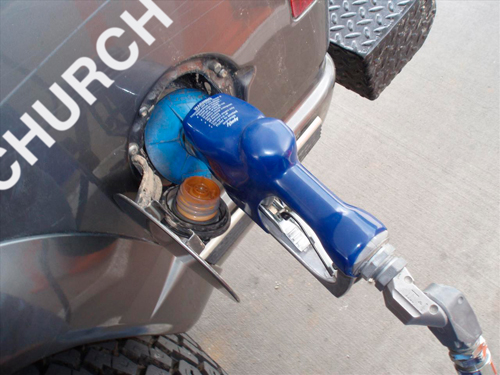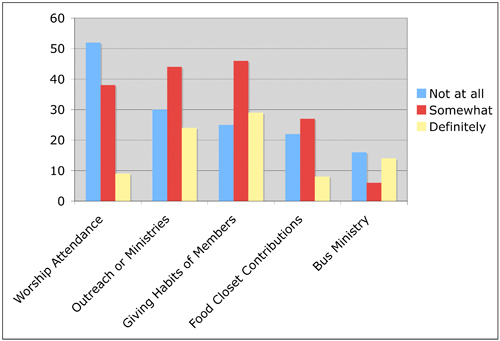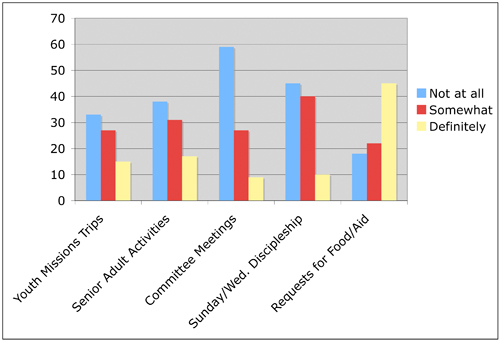The pain at the pump is having a definite impact on the outreach and ministry efforts of South Carolina Baptist churches, the giving habits of their members, and the frequency of requests for financial assistance; though, as yet, most have not seen a marked decrease in worship or discipleship attendance, according to a recent survey of church leadership conducted by The Baptist Courier.

More than 125 of the state convention’s pastors or church leaders have responded thus far to an Internet survey on The Baptist Courier’s Web site. Alerted to the survey through the Courier’s news alert e-mail system, church leaders were asked to indicate where their churches were seeing the greatest impact of the skyrocketing fuel costs by responding to 10 items with “not at all,” “somewhat,” or “definitely.”
Twenty-nine percent of respondents indicated that they felt giving habits of church members definitely have been affected; when combined with the 46 percent who replied “somewhat,” that figure escalates to nearly three-quarters of all respondents.
As the average price for a gallon of unleaded gasoline across the state surpassed $3.75 early this month – significantly higher than the $2.90 paid a year ago – many pastors say they have become increasingly aware that a majority of their members are now experiencing huge increases in living costs without increases in their income, and some of them feel it necessary to “pass it on” by reducing their giving.
“Many of our members are having to choose which service they attend, rather than attend all services,” remarked Mark Smith, pastor of Mount Lebanon Baptist Church, Greer.
Gas prices also seem to be having equally as great effect on the outreach and ministry efforts of most churches, with 24 percent of church leaders indicating “definitely” and 44 percent selecting “somewhat.”
“We are still accomplishing all our ministries at this time,” pastor Wayne Revisky of Salem Baptist Church, Aynor, assured, but several respondents suggested that pastors may soon start using the phone more and making fewer trips to visit members in the hospital when the need is not urgent or curtailing other discretionary trips.
“In anything ‘essential’ to our mission and ministry, we will – with God’s grace and guidance – find a right and acceptable way to respond to increased costs (e.g., gasoline). In ‘optional’ matters, of course we will adjust as necessary,” agreed Fritz Young, pastor of Wassamassaw Baptist Church, Moncks Corner.
“We do this as families already, so certainly as Christians in the church, we can do likewise,” Young commented, adding that perhaps the time has come for state and national convention leadership to consider more sensible site selections for meetings and to appropriately adjust the number of meetings.
Yet, attendance at Sunday worship, discipleship events, Wednesday night activities, and committee meetings does not appear to have been significantly impacted so far. But many church leaders are just now beginning to identify the growing problem.
“At $3 a gallon, the price was in their minds, but it did not affect their driving habits. At $4, it is just now affecting behavior change,” explained Stephen Burnette, pastor of First Baptist Church, Barnwell.
 Impact of Gas Prices on South Carolina Churches (By Percentage)
Impact of Gas Prices on South Carolina Churches (By Percentage)Ninety percent of church leaders said their Sunday morning attendance had either been affected “not at all” or only “somewhat.” Likewise, the vast majority of respondents, 85 percent,” felt attendance at Sunday night and Wednesday night discipleship events had not fallen off due to gas prices.
Several respondents remarked that they are trying to compact meetings and events and to do more when people are already at church. “We may consider having no Sunday evening services, if things get worse,” Young added. In the meantime, the Wassamassaw congregation, like many others, will “try to be more sensitive and supportive of people with ‘true needs’?” and “pray for our nation’s economy to be strengthened.”
Some churches have also begun offering transportation on church-owned vehicles to those who request it, trying not to fill as many weekdays with church activities, and even supplementing members who are willing to pick up other members with monetary love gifts to help offset gas expenses.
For the most part, however, youth and senior adults are still hitting the highways for mission trips and other outings, though some groups have begun considering not driving the church bus or shortening their travel distances.
Sixty percent of survey respondents said their youth trips had not been adversely affected, but 15 percent felt their mission trips definitely have been impacted. Likewise, 17 percent felt senior adult trips were being impacted, while 69 percent said they have not or only somewhat been affected.
Although only 36 percent of church leaders indicated the presence of a bus ministry, 14 percent, or almost two-fifths, indicated the gas prices were definitely affecting either the number or length of their routes.
But perhaps most telling is that while food pantry contributions have dropped off, the frequency of requests for food or monetary assistance is soaring.
 Impact of Gas Prices on South Carolina Churches (By Percentage)
Impact of Gas Prices on South Carolina Churches (By Percentage)While 49 percent indicated contributions had not risen or changed only somewhat, more than two-thirds of church leaders said they were seeing an increase in the frequency of requests for aid, with 45 percent choosing “definitely.”
“We have a large number of seniors on fixed incomes, and they are having a really tough time,” voiced Don Peake, pastor of Calvary Baptist Church, Clinton.
“People are having to make harder choices in where to spend their available funds; funds are now being poured into their gas tank,” an unidentified respondent explained.
If there is a positive side, some of the pastors indicated that in spite of tightening church and family budgets, they have observed a heightened awareness of the needs of single moms, the elderly, lower-income families, the unemployed, and others who are struggling under the nation’s ailing economy.
“The biggest impact is on those whose budgets are already stretched,” minister of education Johnny Dyer of First Baptist Church, Fountain Inn, reminded.
“Our folks have become more responsive to our food pantry ministry as a result of seeing firsthand the crunch in their own wallets,” one minister wrote. “People do seem to be more concerned about the elderly,” and they are becoming “more compassionate toward low-income families who are struggling,” Johnny Cox of Providence Baptist Church, Pageland, and other church leaders, observed.
Seemingly speaking for pastors everywhere, Dusty Bradshaw of Hillcrest Baptist Church, North Charleston, reassured, “We are continuing to be good stewards of the resources God gives to us, but we are diligently working not to allow outside influences to affect ministry. We believe that God will provide what we need to provide ministry.”
Editor’s Note: Pastors or other church leaders may still participate in the Gas Price Survey through June 18 by visiting The Baptist Courier’s Web site at www.baptistcourier.wpengine.com. An updated report is planned for the June 26 issue.
Special thanks to Tom Crites of the Georgia Baptist Convention’s research department for assistance in creating the online survey.
